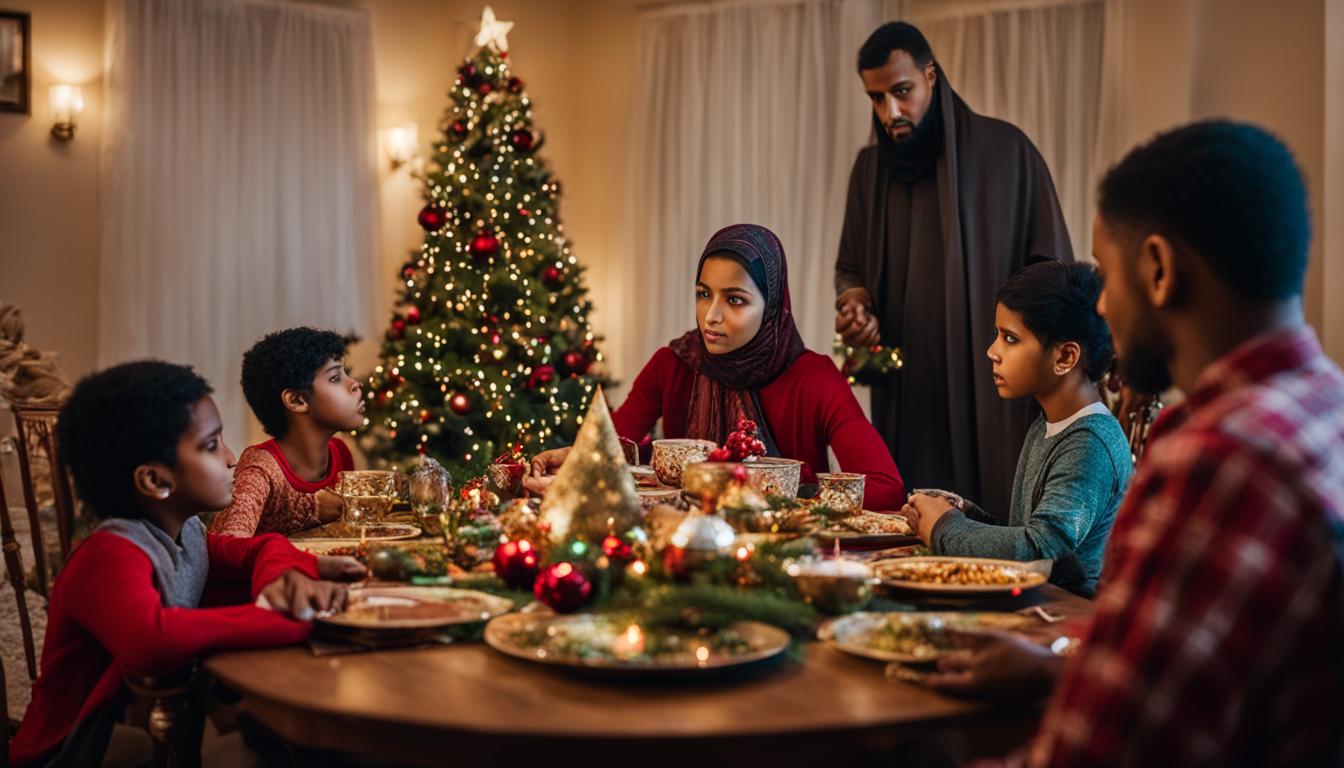Muslims do not celebrate Christmas due to religious restrictions and beliefs in Islam. While Jesus and his mother, Mary, are highly revered in Islam, the birth of Jesus or any other prophet is not celebrated. Both the Quran and Bible provide evidence that 25th December is not the actual date of Jesus’ birth. Celebrating Christmas as the birthday of Jesus is seen as adopting his teachings, and if those teachings are not followed, it is believed to invoke the displeasure of the Almighty. Muslims are encouraged to follow the teachings of Islam and celebrate their own festive days, such as Eid.
Key Takeaways:
- Muslims do not celebrate Christmas due to religious beliefs and teachings in Islam.
- The birth of Jesus or any other prophet is not celebrated in Islam.
- Both the Quran and Bible provide evidence that 25th December is not the actual date of Jesus’ birth.
- Celebrating Christmas as the birthday of Jesus is seen as adopting his teachings in Islam.
- Muslims are encouraged to follow the teachings of Islam and celebrate their own festive days, such as Eid.
The Significance of Christmas in Islam
In Islam, the celebration of Christmas does not hold religious significance as it does in Christianity. Muslims do not believe that Jesus is the son of God, and therefore, his birth is not commemorated with festivities.
In Islamic teachings, Jesus is considered a prophet and messenger of God. Muslims respect and revere Jesus, but they focus more on his teachings rather than his birth. The Quran emphasizes the importance of following the teachings of all the prophets, including Jesus.
Islamic culture has its own set of religious festivals, such as Eid al-Fitr and Eid al-Adha, which are widely celebrated by Muslims around the world. These festivals hold deep religious and cultural significance for Muslims and mark important events in their faith.
While Muslims respect the right of Christians to observe and celebrate Christmas, it is not a part of their own religious practices. Islam encourages Muslims to maintain their own cultural and religious identity while respecting the beliefs of others.
Is it Haram for Muslims to Celebrate Christmas?
While it is not explicitly stated in Islamic teachings that celebrating Christmas is haram (forbidden), it is discouraged due to the religious differences and beliefs between Islam and Christianity.
Islam does not recognize Jesus as the son of God, and celebrating Christmas would imply accepting this Christian belief, which contradicts the core tenets of Islam. In Islam, associating or participating in practices that are considered shirk (polytheism) is considered a major sin.
Therefore, Muslims are advised to refrain from celebrating Christmas or engaging in activities that are associated with it. This includes participating in Christmas rituals, decorating Christmas trees, or exchanging Christmas greetings that may imply acceptance of the Christian belief system.
Instead, Muslims are encouraged to focus on their own religious festivals and celebrations, such as Eid, which hold significant religious and cultural importance in the Islamic faith.

Understanding the Islamic View on Christmas Festivities
In Islam, it is important for Muslims to have a respectful and understanding attitude towards the beliefs and practices of other religions, including Christianity. While Muslims do not celebrate Christmas as a religious holiday, they can still participate in certain aspects of the festive season, such as exchanging gifts with friends and family.
Gift-giving is a common practice in many cultures, and it is not exclusive to the religious aspect of Christmas. Muslims can engage in this tradition as a gesture of goodwill and love towards their loved ones, without compromising their own religious identity.
However, it is essential for Muslims to ensure that the gifts they exchange do not conflict with Islamic principles and values. They should be mindful of the commercialization and excessive spending often associated with Christmas, and instead, prioritize modesty and simplicity in their gift choices.

The Role of Culture and Religion in Christmas Celebration for Muslims
The celebration of Christmas holds different meanings and levels of participation among Muslims, influenced by their cultural backgrounds and individual beliefs. In Muslim-majority countries, the observance of Christmas is generally not as extensive or extravagant as it is in countries with a Christian majority.
In countries such as the United Arab Emirates, where a multicultural society thrives, Christmas is acknowledged and celebrated to some extent. This is primarily due to the tolerance and acceptance of different cultures and religions. While Muslims may participate in certain cultural aspects of Christmas, it is important for them to maintain their own religious identity and not compromise their faith.
The diversity in the United Arab Emirates allows for a respectful coexistence of different religious celebrations. Muslims recognize the significance of Christmas to their Christian friends and acquaintances and may exchange greetings or small gifts as a gesture of goodwill and inclusivity. However, it is crucial for Muslims to ensure that their participation in Christmas celebrations remains within the boundaries of their faith.
By maintaining their religious identity while engaging in cultural festivities, Muslims in the United Arab Emirates exemplify the harmonious coexistence between different faiths. This approach allows them to appreciate the diversity of their society while upholding their own religious values and traditions.
Conclusion
Muslims do not observe Christmas due to its conflicting nature with their religious beliefs and practices. In Islam, Jesus is considered a highly esteemed prophet, but not the son of God, and his birth is not celebrated. While adherents of Islam respect the right of Christians to observe and enjoy Christmas, it remains outside the realm of their own religious customs.
Instead, Muslims are encouraged to uphold their own cultural and religious identity by celebrating festivals such as Eid. These occasions hold deep significance for Muslims and provide them with an opportunity to celebrate their faith, strengthen family bonds, and reflect on the teachings of Islam.
It is important for Muslims to foster an understanding and respect for the beliefs of others, including those who celebrate Christmas. While cultural aspects of the holiday, such as gift-giving, may be embraced by Muslims, they are encouraged to prioritize modesty, simplicity, and adherence to Islamic values.
By staying true to their own faith and traditions, while appreciating and respecting the practices of others, Muslims can navigate the holiday season with harmony and peace.
FAQ
Why can’t Muslims celebrate Christmas?
Muslims do not celebrate Christmas because it goes against their religious beliefs and teachings. While Jesus and his mother, Mary, are highly revered in Islam, Muslims do not celebrate the birth of Jesus or any other prophet. The Quran and Bible both provide evidence that 25th December is not the actual date of Jesus’ birth. Celebrating Christmas as the birthday of Jesus is seen as adopting his teachings, and if those teachings are not followed, it is believed to invoke the displeasure of the Almighty. Muslims are encouraged to follow the teachings of Islam and celebrate their own festive days, such as Eid.
What is the significance of Christmas in Islam?
In Islam, Christmas does not hold religious significance as it does in Christianity. Muslims do not believe that Jesus is the son of God, and therefore, do not celebrate his birth. Islam views Jesus as a prophet and messenger of God, but celebrates his teachings rather than his birth. Islam has its own set of religious festivals, such as Eid, which hold significance for Muslims. While Muslims respect the right of Christians to observe and celebrate Christmas, it is not a part of their own religious practices.
Is it haram for Muslims to celebrate Christmas?
It is not explicitly stated in Islamic teachings that celebrating Christmas is haram (forbidden), but it is discouraged due to the religious differences and beliefs. Celebrating Christmas would imply accepting the Christian belief that Jesus is the son of God, which goes against the core tenets of Islam. Associating or participating in practices that are considered shirk (polytheism) is considered a major sin in Islam. Therefore, Muslims are advised to refrain from celebrating Christmas or engaging in activities that are associated with it.
Can Muslims exchange gifts on Christmas?
Muslims are encouraged to respect and understand the beliefs of other religions, including Christianity. While Muslims do not celebrate Christmas, they can still exchange gifts with friends and family on this occasion, as gift-giving is a common practice in many cultures and is not exclusive to the religious aspect of Christmas. However, it is important for Muslims to ensure that the gifts do not conflict with Islamic principles and values. Muslims should also be mindful of the commercialization and excessive spending often associated with Christmas, making sure to prioritize modesty and simplicity.
What is the role of culture and religion in Christmas celebration for Muslims?
The celebration of Christmas varies among Muslims depending on their cultural backgrounds and personal beliefs. In Muslim-majority countries, the celebration of Christmas is generally not as widespread or elaborate as it is in Christian-majority countries. However, in countries like the United Arab Emirates, where there is a multicultural society, Christmas is acknowledged and celebrated to some extent. This is primarily due to the country’s tolerance and acceptance of different cultures and religions. While Muslims may participate in cultural aspects of Christmas, it is important for them to maintain their own religious identity and not compromise their faith.

